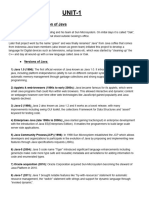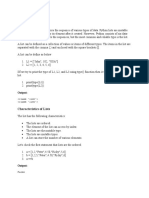0 ratings0% found this document useful (0 votes)
25 viewsJava String Class Presentation Content
Uploaded by
23cs037Copyright
© © All Rights Reserved
We take content rights seriously. If you suspect this is your content, claim it here.
Available Formats
Download as DOCX, PDF, TXT or read online on Scribd
0 ratings0% found this document useful (0 votes)
25 viewsJava String Class Presentation Content
Uploaded by
23cs037Copyright
© © All Rights Reserved
We take content rights seriously. If you suspect this is your content, claim it here.
Available Formats
Download as DOCX, PDF, TXT or read online on Scribd
You are on page 1/ 2
Java String Class - Presentation Content
Slide 1: Introduction to the Java String Class
- The `String` class in Java is part of the `java.lang` package.
- `String` objects are **immutable**, meaning their values cannot be changed after creation.
- Strings in Java are used to store and manipulate text data.
Slide 2: String Class Characteristics
- The `String` class is **final**, meaning it cannot be subclassed.
- Java strings are internally represented as a sequence of characters.
- All string literals in Java are instances of the `String` class.
Slide 3: Creating Strings in Java
1. **Using String Literal**: `String str = "Hello";`
2. **Using `new` Keyword**: `String str = new String("Hello");`
Slide 4: String Pool
- Java maintains a **String Pool** to store unique string literals.
- When a new string literal is created, Java checks if it's already in the pool:
- If it exists, a reference to the existing string is returned.
- If not, the string is added to the pool.
- The String Pool helps save memory.
Slide 5: Important String Methods
- **`length()`**: Returns the length of the string.
- Example: `str.length()`
- **`charAt(int index)`**: Returns character at a specified index.
- Example: `str.charAt(2)`
Slide 6: String Comparison Methods
- **`equals(String anotherString)`**: Compares two strings for equality.
- Example: `str1.equals(str2)`
- **`compareTo(String anotherString)`**: Lexicographically compares two strings.
- Example: `str1.compareTo(str2)`
Slide 7: String Manipulation Methods
- **`concat(String str)`**: Concatenates the specified string.
- Example: `str1.concat(" World")`
- **`replace(char oldChar, char newChar)`**: Replaces characters.
- Example: `str.replace('a', 'o')`
Slide 8: Substring and Case Conversion
- **`substring(int start, int end)`**: Extracts a portion of the string.
- Example: `str.substring(1, 4)`
- **`toUpperCase()` and `toLowerCase()`**: Converts case.
- Example: `str.toUpperCase()`
Slide 9: Searching within Strings
- **`contains(CharSequence s)`**: Checks if sequence exists.
- Example: `str.contains("Hello")`
- **`indexOf(String str)` and `lastIndexOf(String str)`**: Finds position of a substring.
- Example: `str.indexOf("l")`
Slide 10: Trimming and Whitespace Removal
- **`trim()`**: Removes leading and trailing whitespace.
- Example: `str.trim()`
Slide 11: String Immutability and Memory Efficiency
- Immutability improves security and caching.
- Strings can be safely shared across multiple threads.
- The String Pool minimizes duplicate strings in memory.
Slide 12: Example: Using String Class Methods
```java
String phrase = " Welcome to Java Programming! ";
String trimmedPhrase = phrase.trim();
String upperCasePhrase = trimmedPhrase.toUpperCase();
String subPhrase = upperCasePhrase.substring(11, 15);
System.out.println("Original Phrase: " + phrase);
System.out.println("Trimmed Phrase: " + trimmedPhrase);
System.out.println("Uppercase Phrase: " + upperCasePhrase);
System.out.println("Substring: " + subPhrase);
```
This example demonstrates using trimming, uppercase conversion, and substring
extraction.
You might also like
- Protechsoft Java Guideline Material PDFNo ratings yetProtechsoft Java Guideline Material PDF229 pages
- x (Lec-25 or 30)Java SE(String Handling)No ratings yetx (Lec-25 or 30)Java SE(String Handling)17 pages
- 8 String Class 23 Jul 2020material I 23 Jul 2020 Lecture5 StringsNo ratings yet8 String Class 23 Jul 2020material I 23 Jul 2020 Lecture5 Strings16 pages
- STRINGS StringBuffer StringBuilder StringTokenizerNo ratings yetSTRINGS StringBuffer StringBuilder StringTokenizer9 pages
- DSA Module 4 Java Strings Methods 1weekNo ratings yetDSA Module 4 Java Strings Methods 1week19 pages
- Module2 Java File Handling and ExceptionsNo ratings yetModule2 Java File Handling and Exceptions35 pages
- Dokumen - Tips 11 String and String Builder JavaNo ratings yetDokumen - Tips 11 String and String Builder Java33 pages
- Introduction To Java String Handling - Class - 10No ratings yetIntroduction To Java String Handling - Class - 105 pages
- Postgresql Jsonb: Learn This Powerful Tool By ExampleFrom EverandPostgresql Jsonb: Learn This Powerful Tool By ExampleNo ratings yet
- Introduction To The Java Collections FrameworkNo ratings yetIntroduction To The Java Collections Framework7 pages
- Student Support Material Class Xii - CsNo ratings yetStudent Support Material Class Xii - Cs150 pages
- Top 50 Java Thread Interview Questions Answers For ExperiencedNo ratings yetTop 50 Java Thread Interview Questions Answers For Experienced60 pages
- Class 10 - Data Structures - List-ModifiedNo ratings yetClass 10 - Data Structures - List-Modified57 pages
- RUST AND GOLANG FOR BEGINNERS 2 BOOKS IN 1 - Learn Coding Fast RUST AND GOLANG Crash Course, A QuickStart Guide, Tutorial... (TAM SEL) (Z-Library)No ratings yetRUST AND GOLANG FOR BEGINNERS 2 BOOKS IN 1 - Learn Coding Fast RUST AND GOLANG Crash Course, A QuickStart Guide, Tutorial... (TAM SEL) (Z-Library)329 pages
- Languages On The JVM - Groovy, Ruby, Scala, ClojureNo ratings yetLanguages On The JVM - Groovy, Ruby, Scala, Clojure66 pages
- Instant Download Secure by Design 1st Edition Dan Bergh Johnsson Daniel Deogun Daniel Sawano PDF All Chapters100% (1)Instant Download Secure by Design 1st Edition Dan Bergh Johnsson Daniel Deogun Daniel Sawano PDF All Chapters55 pages































































































